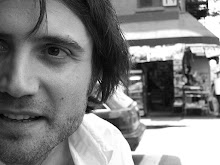Composition is a strange world. Very strange. A skilled composer is one who consistently surprises you, showing you that he or she has the depth and skill to take a composition in
any direction, that they
own the composition at hand and are effectively its master.
Yes, we could go there, could go there too, but we're going here, whether you like it or not. Since any composer worth his or her salt commands a broad and developed language, I like to think that some of my favorite works could have been quite different and still exist as masterpieces.
However, an outstanding composition, much like a great novel or movie, damningly creates the illusion of inevitability.
Bovary had to kill herself in the end... Chinatown had to end in bloodshed. Once the opening gesture or mood of a piece is established, the composer must convince us that all that happens from there
must happen. In music, it's not enough just to listen to a series of events if a work is to demand repeated listening. Successive musical events must flow from one another seemingly effortlessly, temporarily convincing you that each one only could have lead to the next. For a piece to exist as itself and preserve the special identity we give to it, each event within it is crucial, unavoidable, and cancels any other possibilities that might have existed otherwise. Later on, upon analysis, we can say that this chord
might have lead here, this part
could have been played by the oboe instead of the clarinet, this gesture
could potentially be sequenced a certain, perhaps more obvious way. However, in the end, these possibilities didn't happen, and that just
is. If a piece is going to momentarily transform us, we accept this and go along for the ride, dismissing any serious thought that it might have been any different .
Within all this, though, one can't underestimate the importance of surprise. While creating this myth of inevitability, the composer must constantly create a feeling of expectation in the listener. Depending on the whim and skill level of the composer, this expectation is then either fulfilled or broken, leaving the listener constantly on edge, never knowing whether or not to trust his or her instinct. In the end, however, once that next idea comes, whether it fulfills expectation or jolts the listener out of any sense of comfort they might have achieved, the listener simply accepts it as part of the ride, part of a vision that is greater than the human involved in creating it, a vision that has transformed the work at hand into something timeless, something that despite all the options a composer might have considered, ended up like this, and now exists and has an identity all to itself.






